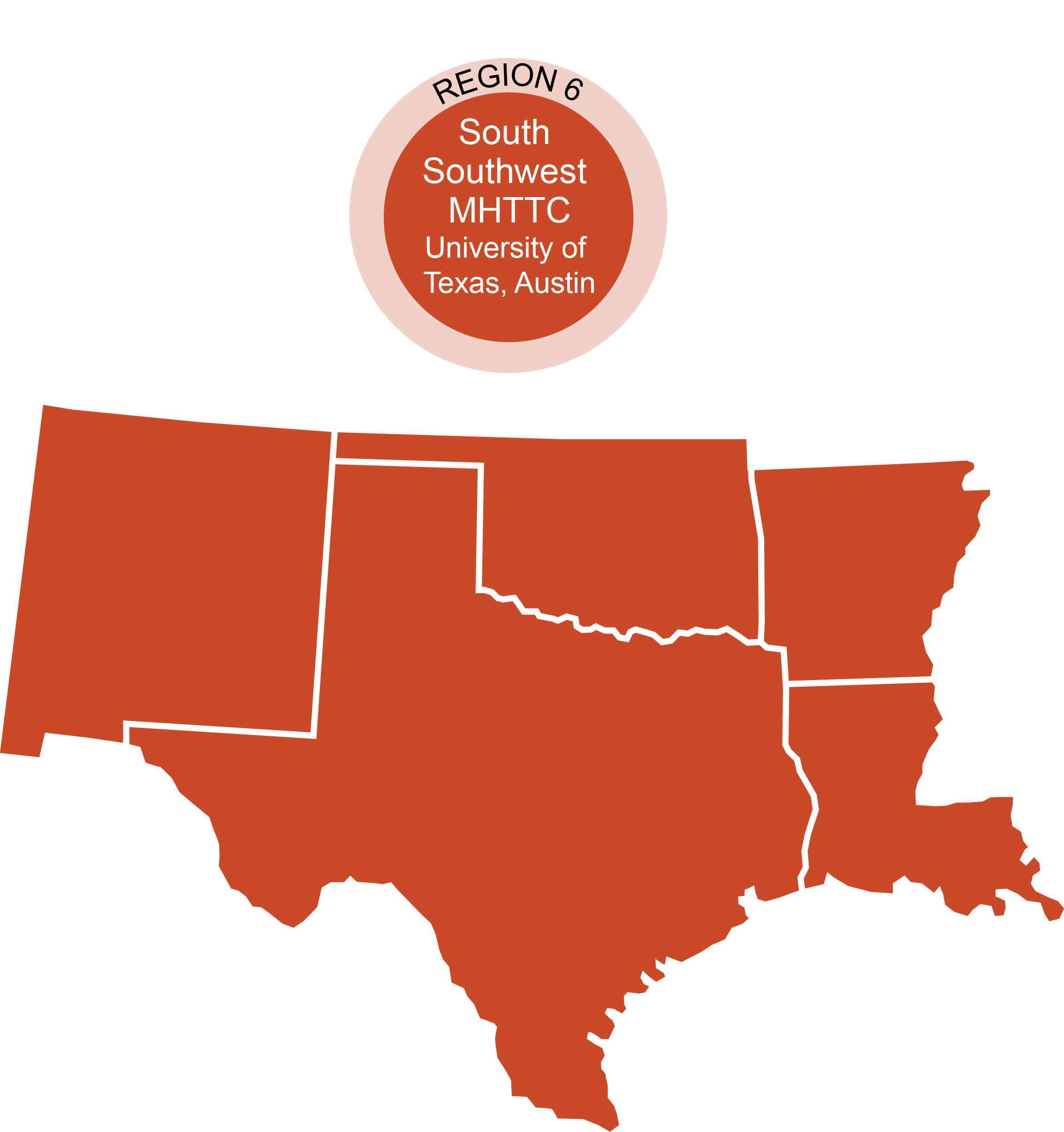Home > MIC Stories: Texas School Mental Health Professional Learning Community and Support of Small and Rural Districts

MIC Stories (MHTTCs Implementing Change) feature technical assistance projects that had a significant impact on practice.
Texas legislative changes spurred the need for schools to think differently about supporting school mental health. With over 1200 districts, Texas relies on Regional Educational Service Centers to support Local Education Agencies (LEAs) through training and technical assistance. However, Texas Educational Service Centers had varying expertise in school mental health and no organized process for supporting implementation of school mental health best practices within their region. In collaboration with the South Southwest MHTTC, Texas’ State Education Agency developed a school mental health model, based in part on the information outlined in the National School Mental Health Best Practices: Implementation Guidance Modules.
In partnership with the Texas Education Agency and Texas Health and Human Services Commission, the South Southwest MHTTC began a monthly Professional Learning Community to train regional staff as trainers in the National School Mental Health Best Practices: Implementation Guidance Modules and regional coaches to support implementation within LEAs. To increase the relevance of the learning opportunity and pilot implementation within the state, the Texas Education Agency provided a grant to each regional education center to provide training and technical assistance to five small and rural school districts in their region.
This Professional Learning Community began in February 2020 and is ongoing. It takes place virtually throughout the state, with ninety-minute monthly virtual meetings, as well as optional virtual office hours for any technical assistance questions.
Participants include 20 regional education center mental and behavioral health teams that had some expertise around supporting mental and behavioral health in schools. This was an important strategy on its own, as the Texas Education Agency did not have a communication platform to do outreach to these individuals. The ESC teams each have at least one team member who is supporting the Title IVA small and rural grant. These team members were required to participate in the Professional Learning Community learnings and provide technical assistance and coaching to their districts on this content. The small and rural schools were selected by the regional education centers based on their interest and readiness. Therefore, school mental health teams at each of the twenty regions include:
Texas also had a new role instituted in legislation - a non-physician mental health provider hired by the local community mental health center, but embedded within the regional education centers. These professionals joined the Professional Learning Community in progress. The total number of participants each month ranges from 65-100 individuals.

The South Southwest MHTTC partnered with Texas’ state education and mental health authorities on this initiative and the implementation strategies utilized attest to the strength of partnering. The initiative included the following implementation strategies:
The Professional Learning Community began before COVID-19 had been identified. With the pandemic, school districts were significantly impacted by changes to priorities, and some expectations had to be adjusted. Regional teams reported the primary barriers were time and the overwhelm felt by school staff. The timeline, scope and sequence pivoted based on the needs of the regional teams supporting the LEAs. Throughout the Professional Learning Community, we realized the importance of providing and modeling a trauma-informed and healing-centered environment for the teams. The South Southwest MHTTC trauma-informed expert facilitated grounding exercises at Professional Learning Community sessions as well.
The South Southwest MHTTCs collected qualitative data and GPRA survey at each meeting and reviewed the results with partners monthly. Mid-year surveys were completed in February by each regional education center team to document activities, with plans to conduct additional surveys in the fall. SHAPE quality assessments were also collected.
Sixty school districts had completed the SHAPE assessment by the mid-year report, with average scores ranging from emerging (Impact) to progressing (all other elements). Fifty LEAs completed mental health needs assessments and 52 completed a resource map. Eleven completed school climate surveys and nine completed a campus service delivery plan (mental health strategic plan). A total of 154 trainings or professional learning community events had been held. Some key accomplishments shared by regional education center teams were the hiring of key staff, connecting districts with telehealth services, and strengthening of relationships.
The following two quotes demonstrate the initial impact:
The core information from the Professional Learning Community is being built into a series of online training modules, which will be provided to school mental health teams and behavioral threat assessment teams in the state. This will provide a shared vision and common language around school mental health, as well as support access to resources. Regional education center staff will be freed up to focus on coaching teams in implementation. The monthly Professional Learning Community meetings have been shifting to a space of collaboration, sharing best practices and support. As additional needs are identified, these will be added to the tools and resources.
Collaboration with agency leadership has strengthened the South Southwest MHTTC's capacity for greater reach. Because of this approach, many more schools across Texas are receiving technical assistance and support from regional education centers in the foundational work of SMH. The ground work has been laid for many LEAs. Although still in its infancy, many best practices have been embedded within the overall framework that was developed and the training materials support implementation. Our staffing would not have allowed for intensive support to many districts, given the size of the state, and the use of a train-the-trainer model was the logical pathway. The Professional Learning Community was significantly more impactful because regional education center participants had funding support and expectations to use the information as they were learning it, and the flexibility to work with districts to meet their unique needs. Unfortunately, the impact of the pandemic made this work more challenging, but also increased its relevance to school districts.

The South Southwest MHTTC, funded by the Substance Abuse and Mental Health Services Administration, is housed in the Texas Institute for Excellence in Mental Health at University of Texas at Austin. The South Southwest MHTTC serves U.S. Department of Health and Human Services Region 6, including Arkansas, Louisiana, New Mexico, Oklahoma, and Texas. The Center's population of focus is mental health clinicians, supervisors, and program managers serving individuals with or at risk of serious emotional disturbances (SED) or severe mental illness (SMI); peer support providers; community mental health, health, or peer-run organizations; and single state agency administrators focused on comprehensive state public mental health systems.